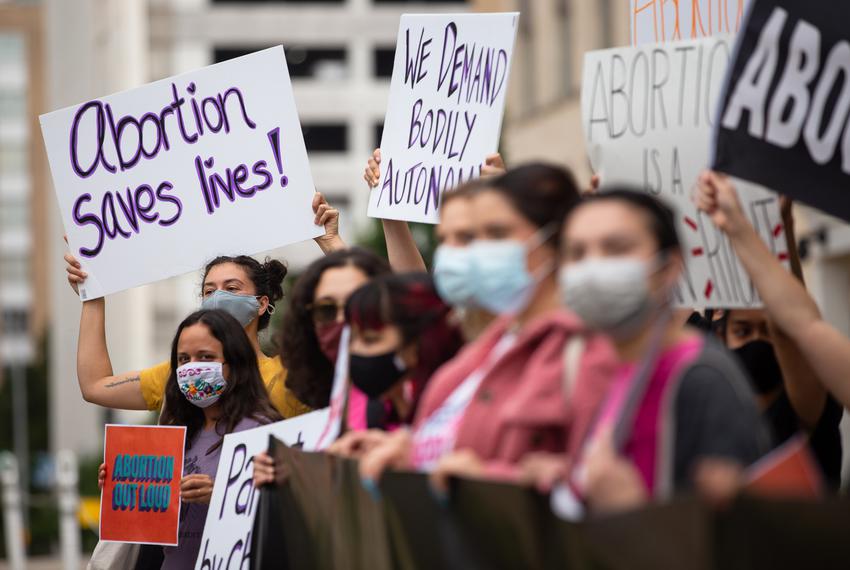Courts prevented the implementation of abortion restrictions in two states, while politicians in a third state are pressing ahead with a proposal for a new, less restrictive ban.

This week, courts prevented the implementation of abortion restrictions in two states, while politicians in a third state are pressing ahead with a proposal for a new, less restrictive ban.
These are some of the most recent changes being made to the abortion scene around the nation by legislators, governors, and judges in the wake of the Roe v. Wade decision by the U.S. Supreme Court last year, which invalidated the right to an abortion for all women nationally.
North Carolina Republican Legislators Reach Agreement on Key Issues
New abortion restrictions that would be among the least onerous implemented since last year, according to North Carolina lawmakers, have been approved.
The legislation, which is a top goal for the GOP, would outlaw abortions beyond the first 12 weeks of pregnancy, except rape, incest, and fetal abnormalities instances.
The present exemption for situations when the pregnant woman’s life is in jeopardy would continue. Most abortions are now prohibited in the state after 20 weeks of pregnancy.
However, the GOP now holds majorities in both legislative chambers that are veto-proof after one state lawmaker switched from the Democratic Party to the Republican Party last month.
Court Rejects New Restrictions as Unlawful
A ban on abortion clinics was enacted by lawmakers in Utah, where a ban on abortions at all stages of pregnancy is already on hold until a judge determines whether it is lawful.
Utah’s lawmakers and the administration of Montana Governor Greg Gianforte were experimenting with certain abortion restrictions that differed from those in other Republican-led states.
Before the state’s Medicaid program in Montana would have paid for an abortion, a new regulation would have required doctors to give evidence that the procedure was medically necessary when there is a risk to the pregnant woman’s health, or in the case of incest or rape.
A ban on abortion clinics was enacted by lawmakers in Utah, where a ban on abortions at all stages of pregnancy is already on hold until a judge determines whether it is lawful.
Advocates for abortion rights in both states said that the limitations would have been excessive.
Judges rejected both concepts in judgments this week, at least until the legality of them is established.
Montana GOP Continues to Advocate for Their Agenda
Another Montana abortion limitation that a judge temporarily suspends is the Medicaid regulation. The imposition of a restriction after 20 weeks of pregnancy has also been halted by courts.
Legislators have now resorted to other limitations while that is on hold.
Another Montana abortion limitation that a judge temporarily suspends is the Medicaid regulation
Along with four other anti-abortion laws, Gianforte signed a law on Wednesday requiring the same Medicaid preauthorization procedures as the blocked rule.
Among these is the clarification that the right to privacy guaranteed by the state constitution excludes the right to an abortion and the outlawing of dilation and evacuation abortions, the most popular type of abortion performed after 15 weeks.
READ ALSO:Rahul Gandhi: ‘Manhandling’ of women wrestlers shameful
Advancements Made in Legal Protections
At least 19 Democratic-dominated states have now taken action through a statute, constitutional amendment, or presidential order to safeguard access, just as the majority of Republican-controlled states have passed bans or stricter abortion restrictions since last year.
Most states where the status quo persists have split political power between the two parties.
Wes Moore, the Democratic governor of Maryland, signed legislation on Wednesday ensuring access to both abortion and care that promotes gender identity.
Maryland now safeguards citizens from being compelled to help with criminal investigations by other states into medical procedures that are permitted in Maryland, much like other jurisdictions do.
Additionally, new laws mandate that public colleges and universities have a strategy for student access to birth control, including emergency contraception and abortion pills, and protect medical and insurance records on reproductive health in electronic health information exchanges.
A Constitutional amendment to safeguard access to abortion will be on the 2024 ballot.
Moreover, a constitutional amendment to safeguard access to abortion will be on the 2024 ballot.
After eight years with a Republican governor, Democrats seized full control of the executive and legislative arms of state government this year.
A similar bill was approved by Oregon’s legislators on Tuesday and submitted to the Senate. The absence of Republican senators on Wednesday prevented the Democrats in control of the Senate from having a quorum and raised questions about the legislation’s prospects for votes later this week.
Also on Wednesday, the Michigan House approved and forwarded to Democratic Governor Gretchen Whitmer a bill that would prohibit employers from firing workers who get abortions.

(Photo credit: The Texas Tribune)
READ ALSO:US Senate writes to META with concerns over critical data access to developers in China and Russia
Federal Government Launches Investigation
The government did not impose sanctions, but it did order the hospitals to address the issues that prevented the patient from getting an abortion.
According to a federal government probe, two hospitals broke the law when they refused to perform an emergency abortion.
The Kansas and Missouri hospitals that would refuse to perform an abortion on a woman whose water broke prematurely at 17 weeks of pregnancy are being investigated by the U.S. Department of Health and Human Services.
Both medical professionals predicted that the fetus would not survive and warned that the woman ran the risk of developing a serious infection or losing her uterus. However, they refused to abort the pregnancy because they could still hear the fetal heartbeat.
According to the government, this goes against a federal law requiring doctors to provide abortions when a woman’s health is in danger.
The government did not impose sanctions, but it did order the hospitals to address the issues that prevented the patient from getting an abortion.
Restrictions Implemented at the Local Level
Tuesday, the City Council of Danville, Illinois, narrowly approved a law limiting the shipment of abortion drugs.
A clinic is suggested for the area close to the Indiana border, where a court order suspending the restriction on abortions through pregnancy was issued. In contrast, Illinois officials have attempted to portray their state as a safe sanctuary for out-of-state women seeking abortions.
The measure, according to state officials and proponents of abortion rights, is both illegal and unenforceable.
Local limitations elsewhere have not fared successfully.
They were approved by five local governments in Democratic-controlled New Mexico. The state’s Supreme Court temporarily stopped enforcement in March. A municipality in Ohio also chose to alter its regulations last year rather than defending them in court.
